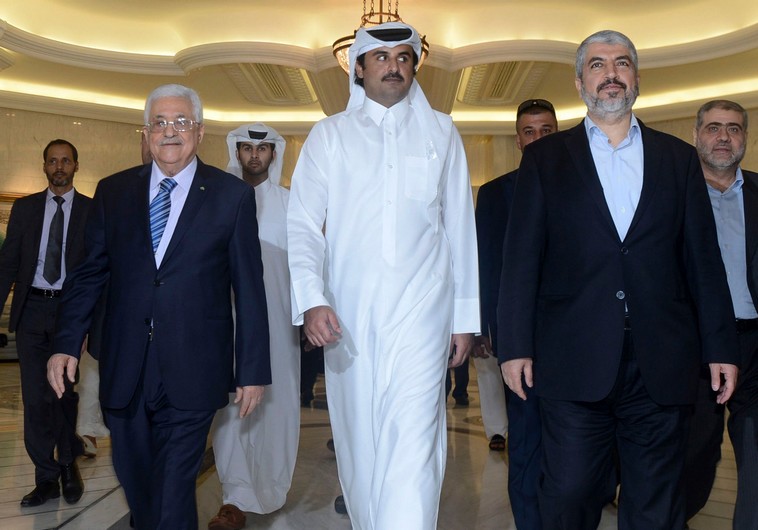Could Qatar, Turkey be in jeopardy if PA brings Israelis before the ICC?
By YONAH JEREMY BOB \ 12/01/2014 /J.Post
In the aftermath of this summer’s Gaza war and a breakdown in peace talks, Palestinian Authority President Mahmoud Abbas is once again threatening to file war crimes complaints with the International Criminal Court against Israeli soldiers and leaders.
The obstacles to the PA joining the ICC, to the ICC taking the case, and the legal counterattack that the PA could face from Israel have been covered for some time.
But there is a new angle that is starting to be discussed, and however unlikely a scenario it may be, it shows another possible backlash impact that the PA’s going after Israelis could have beyond Israel, including on Hamas allies in the region.
The new question is: Could a PA attempt to go after Israel indirectly lead to dragging Qatar and Turkey, which have each supported Hamas in some way, into the mix legally and diplomatically? The base for such a case is that Hamas commits war crimes on Qatar’s dime.
US Under Secretary for Terrorism and Financial Intelligence David Cohen said in March that “Qatar, a longtime US ally, has for many years openly financed Hamas, a group that continues to undermine regional stability. Press reports indicate that the Qatari government is also supporting extremist groups operating in Syria. To say the least, this threatens to aggravate an already volatile situation in a particularly dangerous and unwelcome manner.”
US congressmen have reportedly written to Qatar’s ambassador to the US, complaining of $400 million in support to Hamas.
Could Qatar’s funding of terrorism get it into hot water with the International Criminal Court if sufficient connections can be drawn between Qatar’s funding and Hamas’s rockets fired indiscriminately at Israeli civilians? There are numerous barriers. First, Qatar itself has not joined the ICC’s Rome Statute.
It is also debatable whether financing terrorism would be considered a crime that the ICC would handle.
Though many countries recognize financing terrorism as a crime, the ICC only handles the worst crimes, such as genocide or other kinds of mass violence.
In addition, there would need to be sufficient links between the funding and terror attacks – whereas there appears to be more specific information about Qatari funding in Syria than to Hamas.
To date, no one has seriously considered the ICC going after individuals for the “mere” financing of terrorism, as opposed to actual violent acts or directly providing weapons for violent war crimes.
But the ICC does have jurisdiction over some issues regarding aiding and abetting crimes, which in some countries have included financing terrorism.
So it is at least theoretically possible that an aggressive push by a coalition of Israel supporters and parties wanting to widen the reach of the ICC could lead to going after Qatari individuals, especially those already declared terrorists by the US or others.
And though Qatar has not joined the ICC, one could read into ICC Prosecutor Fatou Bensouda’s recent decision in the Comoros Islands case, in which the island nation requested to investigate Israel for war crimes regarding the raid on the Mavi Marmara in 2010, a wish to expand ICC jurisdiction over an incident into geographic areas beyond where the incident occurred.
In other words, it appeared Bensouda wanted to expand to include geographically distant countries that directly contributed and influenced an incident occurring.
Besides the aiding and abetting terrorism through funding as a possible war crime, Qatar and also Turkey could get caught up in some ugly diplomatic fallout.
If the ICC investigates Hamas, it may demand Khaled Mashaal and his aides in Qatar, or Saleh Aruri and his aides in Turkey – accused of planning to try to bomb Teddy Soccer Stadium and other West Bank-based attacks – be turned over as witnesses or even for arrest.
Turkey is also not a member of the ICC, but it could increase its already tense relations with the West if it was viewed as blocking an ICC investigation into Hamas terrorism.
Many Western countries have criticized Qatar for financing terrorism, and in some cases, like Syria and Libya, of sometimes going beyond providing financing to directly providing weapons.
Despite that criticism, the West continues to compete for Qatari funding; the US’s key base in the Middle East is there, and the West mostly tries to play down tensions with Turkey.
Might Western countries pressure the ICC to stay out of the Israeli-Palestinian mess to avoid dealing with spillover into their relations with Qatar and Turkey? Might Hamas have second thoughts once any process kicks off and its safe havens are on the line, maybe even enough to pull its support as essentially happened in Kenya, when the country decided to pull back from cooperating with the ICC? All of this is highly theoretical, but it again shows that the stakes of the ICC jumping into the Israeli-Palestinian milieu are far from simple.




















